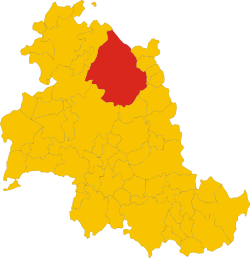Iguvium
| Gubbio | |
|---|---|
| Comune | |
| Città di Gubbio | |

Panorama of Gubbio from Viale Parruccini
|
|
 Gubbio within the Province of Perugia |
|
| Location of Gubbio in Italy | |
| Coordinates: 43°21′N 12°34′E / 43.350°N 12.567°E | |
| Country | Italy |
| Region | Umbria |
| Province / Metropolitan city | Perugia (PG) |
| Frazioni | see list |
| Government | |
| • Mayor | Filippo Mario Stirati (SEL) |
| Area | |
| • Total | 525 km2 (203 sq mi) |
| Elevation | 522 m (1,713 ft) |
| Population (31 December 2010) | |
| • Total | 32,998 |
| • Density | 63/km2 (160/sq mi) |
| Demonym(s) | Eugubini |
| Time zone | CET (UTC+1) |
| • Summer (DST) | CEST (UTC+2) |
| Postal code | 06024, 06020 |
| Dialing code | 075 |
| Patron saint | St. Ubaldus |
| Saint day | May 16 |
| Website | Official website |
Gubbio is a town and comune in the far northeastern part of the Italian province of Perugia (Umbria). It is located on the lowest slope of Mt. Ingino, a small mountain of the Apennines.
The city's origins are very ancient. The hills above the town were already occupied in the Bronze Age. As Ikuvium, it was an important town of the ancient Umbrian people in pre-Roman times, made famous for the discovery there of the Eugubine (or Iguvine) Tables in 1444, a set of bronze tablets that together constitute the largest surviving text in ancient Umbrian. After the Roman conquest in the 2nd century BC — it kept its name as Iguvium — the city remained important, as attested by its Roman theatre, the second-largest surviving in the world.
Gubbio became very powerful in the beginning of the Middle Ages. The town sent 1000 knights to fight in the First Crusade under the lead of count Girolamo Gabrielli, and according to an undocumented local tradition, they were the first to penetrate into the Holy Sepulchre when the city was seized (1099).
The following centuries were quite turbulent, and Gubbio was engaged in wars against the surrounding towns of Umbria. One of these wars saw the miraculous intervention of its bishop, St. Ubaldo Baldassini, who secured Gubbio an overwhelming victory (1151) and a period of prosperity. In the struggles of Guelphs and Ghibellines, the Gabrielli, such as the condottiero Cante de' Gabrielli da Gubbio (c. 1260 - 1335), were of the Guelph faction, supportive of the papacy; as Podestà of Florence, Cante exiled Dante Alighieri, ensuring his own lasting notoriety.
...
Wikipedia

